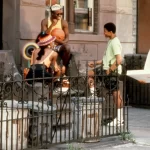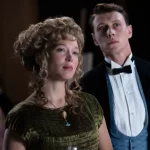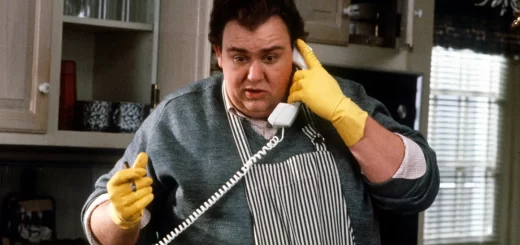Les Cowboys: Now I Know Just How Much I Have Lost, by David Bax
Between Thomas Bidegain’s directorial debut, Les Cowboys, and Felix van Groeningen’s 2012 The Broken Circle Breakdown (not to mention French metal band Phazm and their album, Antebellum Death ‘n Roll), I’m becoming increasingly fascinated by the subculture of French-speaking Europeans glorifying the music and fashion of the American South. As impressive a film as Broken Circle Breakdown is, though, Les Cowboys manages to improve on it, utilizing the tropes and iconography of cowboy culture to build a new and vital discussion of the way the West (of which multiple definitions apply) has experienced Islamic terrorism in the 21st century.
Les Cowboys kicks off with a family attending a country music-themed fair in 1994. Patriarch Alain (François Damiens) sings a tune on stage and later dances with wife Nicole (Agatha Dronne) and daughter Kelly (Ilian Zabeth, from Bertrand Bonello’s House of Tolerance) while quiet son Georges (Maxim Driesen) tags along. As the day comes to a close, though, Kelly is nowhere to be found. A quick interrogation of her schoolmates reveals that she’s been seeing a boy named Ahmed (Mounir Margoum), who has also disappeared. Writings found in Kelly’s bedroom imply a hidden religious conversion. A panicked Alain follows what clues he can in an unsuccessful attempt to trace his daughter’s steps. Then, Bidegain leaps years forward (and not for the last time), giving us no clues as to how much time has passed. All we know is that Alain is still looking for Kelly and has recruited Georges (now almost a man and played by Finnegan Oldfield) in his quest, taking them from Belgium to Holland to Turkey and more. The only eventual date markers we get are television reports of the real life terrorist attacks in New York City, Madrid and London.
Driving from place to place, spending all of his money on tips and bribes, Alain continues to sport the cowboy hat he wore the day Kelly left. This makes both the plot and character allusions to John Ford’s The Searchers apparent but underneath them are more thorny and delicate parallels that Bidegain nudges the audience to consider.
By creating an analogy between modern day Islam and Ford’s Comanche tribe, Bidegain asks us to consider how both groups are homogenized and villainized by white Christians. Yet by also connecting Alain and Georges to the family members of abducted children in the older film, he reminds us how hard it can be to differentiate between elements of a group of others once some of their number have wronged you. Les Cowboys is not overly concerned with giving us a balanced look at the two sides; in fact, few of the film’s Muslim characters become distinguishable individuals. Instead, Bidegain interrogates the narrative of the Western genre and its cowboy heroes from their own point of view. As the hunt continues, bringing our characters to rural Pakistan where they ride horses under a big, open sky, the film’s aesthetics grow to fit the brand more and more, yet our protagonists begin to seem less and less gallant.
The score, by the mono-monikered Raphaël, alternates between minimal, impressionistic tones and grand, emotional cues of a more classical stripe. In much the same way, Bidegain trades off straightforward narrative presentations with elegiac sequences where characters soliloquize in voiceover behind shots of their own stoic faces and bodies.
In many ways, this represents the mission statement of Les Cowboys. It delivers a familiar genre tale while simultaneously diffusing and dissecting its meaning. With its sudden plot turns and jumps in time, the film is something of a melodramatic mini-epic that is also an arthouse provocation. Impressively, it succeeds at both.






























